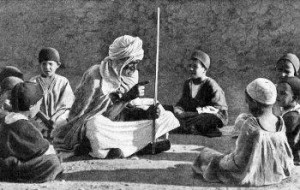Respecting teachers in any field is very important, particularly if one wants to excel in that field. This respect is automatically followed by dedication, hardwork and sincerity that takes a person to high levels of success.
If you look into the history of Islam, teachers or tutors or mentors have been held on high esteem by their students which made them excel in their fields. Every scholar of his time, every great personality of his time respected his teachers, giving them a status just next to their parents. This aspect is very important when a child learns Quran. The Quran teacher must be respected by the child at all times and must maintain the Adab and discipline. The parents must show full respect to the teacher and never belittle him in front of their child, even if they believe that the teacher was mistaken. Rather, the child should view his teacher as the ideal Qur’an teacher, and this will be based on what the child observes from his parents’ attitude toward the teacher.
Abu Salamah narrates that Ibn ‘Abbaas went to Zayd ibn Thaabit (may Allah be pleased with them all) and held the reign of his riding beast. Zayd said: “Backoff, cousin of Allah’s Messenger (pbuh).” Ibn ‘Abbaas replied: “Certainly, this is how we treat our scholars and our elders”. [Mustadrak al-Haakim, vol 3, p 423]
Imam ash-Shaafi’ee, may Allah have mercy on him, said: “When sitting in front of Imam Maalik, I would turn the pages very gently so he would not hear it, due to my awe of him.”
The parents should know that the teacher, like any other human being, is not infallible and will make mistakes. However, respect should still be maintained in dealing with him. So, for example, if the child informs his parents of an improper action done by his teacher, Like hitting, cursing, or bad treatment, then the parents should firstly listen to the child while remaining calm and attentive. They should not then speak ill of the teacher in front of the child. Rather, one of the parents should approach the teacher for a calm and respectful discussion regarding what their child has informed them. The parent can nicely tell the teacher something like, “My child mentioned to me that you did such and such.
However, I did not believe him, and I told him: ‘It is impossible for your teacher to do such a thing, and perhaps you misunderstood what he was saying.’ So I am coming to inform you because perhaps the other students understood what my child understood, and then they would all think negatively of you.”
With this approach, the teacher is confronted, yet his honor is not degraded. Furthermore, the problem is not left without treatment. And this is what Allah, Most High, ordered us to do when enjoining one another with truth and patience. And Allah knows best.


